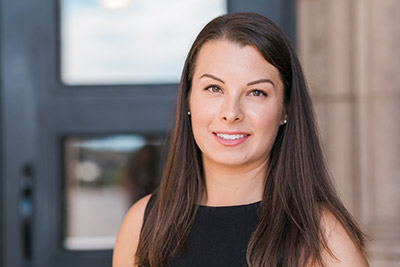Sylvia Badon likes to cite Benjamin Franklin’s adage, “an ounce of prevention is worth a pound of cure.” Franklin may have been speaking about fire safety, but Badon, a fourth-year PhD candidate in epidemiology at the University of Washington School of Public Health, uses the quote to explain her motivation to improve the health of communities by preventing diseases.

Badon—a Chicago native—majored in biology at the University of Chicago, but couldn’t decide whether to pursue a career in basic science or clinical medicine. Her work at a developmental biology lab inspired her to do “more big picture” research, she says. She also wanted to “have a larger impact than treating individual patients one by one.”
It wasn’t until an elective during her senior year that she found a field that excited her: epidemiology. It “was a mix of all the things I was looking for,” Badon says. “Population-based research, the potential to make an impact on the health of many people, biology and statistics.”
After completing her BS with honors, Badon earned an MS in epidemiology and biostatistics from Northwestern University Feinberg School of Medicine. For her thesis, she studied data from more than 5,000 mothers and their children, and she found that a woman’s weight gain during pregnancy was associated with her newborn’s birth weight and body fat.
“I was struck by the lasting impact gestational diabetes and weight gain can have on the metabolic development of a fetus,” Badon says. “By studying pregnancy, my goal is to contribute to the prevention of metabolic diseases starting at the earliest possible time—during fetal development.”
Today, Badon continues to investigate how a mother’s lifestyle before and during pregnancy could influence her risk for complications as well as her child’s growth and development. For her PhD dissertation, she is using data from the Omega study—which represents pregnancies delivered at Swedish Medical Center and Tacoma General in Washington state between 1996 and 2008—to compare a mother’s physical activity to her child’s birth weight and head circumference.
For her academic merit and outstanding potential, Badon was named the School’s prestigious Magnuson Scholar for 2016-17. She is one of six students in UW Health Sciences who will receive $30,000 each to support their studies. The award is named in memory of Senator Warren G. Magnuson.
“I’m so honored and grateful to join the community of Magnuson Scholars,” Badon says. “This award will allow me to travel to Denmark to work with the Danish National Birth Cohort as part of my ongoing dissertation research.”

During her time at the UW, she has also won the Achievement Rewards for College Scientists (ARCS) Foundation Fellowship; the Reproductive, Perinatal and Pediatric Epidemiology Fellowship; the Kosciuszko Foundation Scholarship; and the Epidemiology Congress of the Americas Travel Scholarship.
Badon’s mentors, advisers and comrades alike, all expect great things from her. “We have no doubt that Sylvia is poised to make significant contributions in this important area in maternal and child health,” wrote Gayle Reiber, a former professor of health services, and Daniel Enquobahrie, associate professor of epidemiology, in their nomination letter.
After receiving her PhD, Badon plans to pursue a postdoctoral fellowship where she can expand her research to investigate the offspring of more diverse populations as they reach adolescence and adulthood. She is particularly interested in studying long-term health outcomes.
“I see myself in academia,” Badon says. “I’m devoted to reducing obesity, diabetes and other chronic diseases in future generations.”
In her free time, Badon enjoys staying active. She hikes, bikes, plays squash and loves boot-camp style workouts. She also loves to cook and her guilty pleasure, she admits, is “watching infomercials.”
